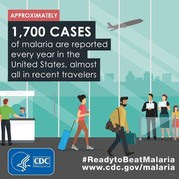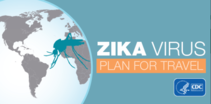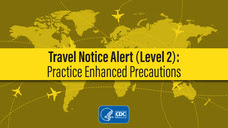
CDC Travelers' Health Update
Wherever your travels take you this spring break, stay healthy and safe with these tips from CDC Travelers' Health.
| ||
|
Clinician Updates
Malaria IV Artesunate Update

Change in Treatment: Starting April 1, 2019, clinicians treating patients with severe malaria should call CDC to obtain IV artesunate, available through an expanded access investigational new drug protocol.
There are approximately 300 cases of severe malaria in the United States each year, most acquired from travel to countries with malaria. Severe malaria is treated with intravenous (IV) antimalarial medications. Beginning April 1, 2019, the only US Food and Drug Administration (FDA)-approved IV antimalarial in the United States (quinidine) will no longer be available. When IV quinidine is no longer available, CDC will make another IV treatment (artesunate) available for severe malaria. IV artesunate is neither FDA-approved nor commercially available for hospitals to purchase and keep in stock (additional information).
How to Counsel Your Patient: Prevention is critical. Patients traveling to destinations where there is risk for malaria should use specific malaria prevention interventions. Often this includes avoiding mosquito bites through insect repellents or insecticide treated bed nets and specific medicines to prevent malaria (chemoprophylaxis).
|
Zika Travel Update

Change in Travel Guidance: CDC has updated its Zika travel guidance for pregnant women and couples who may want to become pregnant. Many areas of the world continue to have Zika transmission, and some areas have outbreaks of Zika. Other areas have confirmed Zika in the past, and we may not know if they have current cases.
CDC collaborated with the World Health Organization and the European Centre for Disease Prevention and Control to review current scientific data available on Zika virus transmission and disease for every country of the world. This review showed that the spread of Zika is no longer at the same high levels seen during the main outbreak period in the Americas during 2015 to 2017. As a result, CDC updated its Zika travel guidance.
How to Counsel Your Patient: For countries with current or past transmission but no current outbreak (purple countries on the map), CDC no longer recommends that pregnant women avoid travel. Instead, discuss travel plans with your pregnant patients. Talk with them about the risks and consequences of possible Zika infection and their willingness to accept that risk if they choose to travel. CDC’s recommendation that pregnant women not travel to areas where a Zika outbreak is occurring has not changed.
|
Weight Loss Surgery Infections in Mexico

CDC continues to investigate an ongoing outbreak of multidrug-resistant Pseudomonas aeruginosainfections in patients who had surgery at Grand View Hospital in Tijuana, Mexico, on or after August 1, 2018, including some who had surgery in 2019. To date, CDC has identified 18 patients who developed infections. A CDC Level 2 Travel Alert advising against surgery at Grand View Hospital remains in effect.
Mexican health officials identified poor infection control practices at Grand View Hospital, including failure to follow recommended practices for assuring the quality of sterilization of medical devices and instruments. These actions might put patients at risk for bacterial infections, such as Pseudomonas aeruginosa, and for infection with bloodborne viruses such as hepatitis B, hepatitis C, and HIV.
CDC recommends that clinicians evaluating patients who had invasive procedures in Tijuana, Mexico, send any carbapenem-resistant organisms for carbapenemase testing and report these infections to their state or local health department. Carbapenemase testing is available free of charge through the Antibiotic Resistance Laboratory Network.Clinicians should discuss bloodborne pathogen testing with all patients who had invasive procedures at Grand View Hospital on or after August 1, 2018. Visit CDC’s outbreak website for additional information.
|
Free CE: Drug-Resistant Salmonella Typhi in Travelers

Join CDC’s COCA call on the recent MMWR: The Emergence of Extensively Drug-Resistant Salmonella enterica serotype Typhi in Travelers.
Authors include our own Dr. Kristina Angelo, travel medicine specialist, & Dr. Allison Taylor Walker, senior epidemiologist.
Tuesday, March 19th, 2-3 pm EST. FREE continuing education credit will be offered.
Register |






















.png)












No hay comentarios:
Publicar un comentario